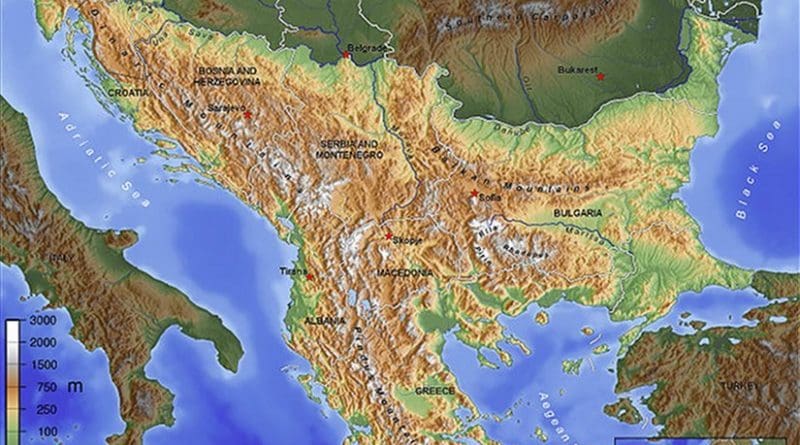EU-Balkan Summit: No Set Timeframe For Western Balkans Accession – Analysis
On October 6, Slovenia hosted a summit between the EU and the Western Balkans states. The EU-27 met with their counterparts (Albania, Bosnia-Herzegovina, Serbia, Montenegro, Macedonia and Kosovo) in the sumptuous Renaissance setting of Brdo Castle, 30 kilometers north of the capital, Ljubljana. Despite calls from a minority of heads of state and government, there were no sign of a breakthrough on the sensitive issue of enlargement. The accession of these countries to the European Union is still not unanimous among the 27 EU member states.
During her final tour of the Balkans three weeks ago, German Chancellor Angela Merkel stated that the peninsula’s integration was of “geostrategic” importance. On the eve of the summit, Austrian Chancellor Sebastian Kurz backed Slovenia’s goal of integrating this zone’s countries into the EU by 2030.
However, the unanimity required to begin the hard negotiations is still a long way off, even for the most advanced countries in the accession process, Albania and northern Macedonia. Bulgaria, which is already a member of the EU, is opposing North Macedonia’s admission due to linguistic and cultural differences. Since Yugoslavia’s demise, Sofia has rejected the concept of Macedonian language, insisting that it is a Bulgarian dialect, and has condemned the artificial construction of a distinct national identity.
Other countries’ reluctance to join quickly is of a different nature. France and the Netherlands believe that previous enlargements (Bulgaria and Romania in 2007) have resulted in changes that must first be digested before the next round of enlargement. The EU-27 also demand that all necessary prior guarantees be provided regarding the independence of the judiciary and the fight against corruption in these countries. Despite the fact that press freedom is a requirement for membership, the NGO Reporters Without Borders (RSF) urged the EU to make “support for investigative and professional journalism” a key issue at the summit.”
While the EU-27 have not met since June, the topic of Western Balkans integration is competing with other top priorities in the run-up to France’s presidency of the EU in the first half of 2022. On the eve of the summit, a working dinner will be held, the President of the European Council, Charles Michel, called for “a strategic discussion on the role of the Union on the international scene” in his letter of invitation to the EU-Balkans Summit, citing “recent developments in Afghanistan,” the announcement of the AUKUS pact between the United States, Australia, and the United Kingdom, which has enraged Paris.
The Western Balkans remain the focal point of an international game of influence in which the Europeans seek to maintain their dominance. As a result, the importance of reaffirming a “European perspective” at the summit was not an overstatement. Faced with the more frequent incursion of China, Russia, and Turkey in that European region, the EU has pledged a 30 billion euro Economic and Investment Plan for 2021-2027, as well as increased cooperation, particularly to deal with the aftermath of the Covid-19 pandemic.
Opening the borders, however, is out of the question. In the absence of progress on this issue, Albania, Northern Macedonia, and Serbia have decided to establish their own zone of free movement (The Balkans are Open”) beginning January 1, 2023. “We are starting today to do in the region what we will do tomorrow in the EU,” said Albanian Prime Minister Edi Rama when the agreement was signed last July.
This initiative, launched in 2019 under the name “Mini-Schengen” and based on a 1990s idea, does not have the support of the entire peninsular region, which remains deeply divided over this project. While Bosnia and Herzegovina and Montenegro are not refusing to be a part of it and are open to discussions, the Prime Minister of Kosovo, Albin Kurti, who took office in 2020, for his part accuses Serbia of relying on this project to recreate “a fourth Yugoslavia”
Tensions between Balkan countries continue to be an impediment to European integration. The issue of movement between Kosovo and Serbia has been a source of concern since the end of September. Two weeks of escalation followed Kosovo’s decision to prohibit cars with Serbian license plates from entering its territory, in response to Serbia’s long-standing prohibition on allowing vehicles to pass in the opposite direction.
In response to the mobilization of Kosovar police to block the road, Serbs in Kosovo blocked roads to their towns and villages, and Serbia deployed tanks and the air force near the border. On Sunday, October 3, the conflict seemed to be over, and the roads were reopened. However, the tone had been set three days before the EU-Balkans summit.
Richard Rousseau, Ph.D. is a specialist in international relations. Formerly professor and chair of political science departments at different universities in Canada, Georgia, Kazakhstan, Azerbaijan and the United Arab Emirates, he has authored over 800 academic, analytical and commentary articles. His research interests include the former Soviet Union, international security, International political economy and Globalization

